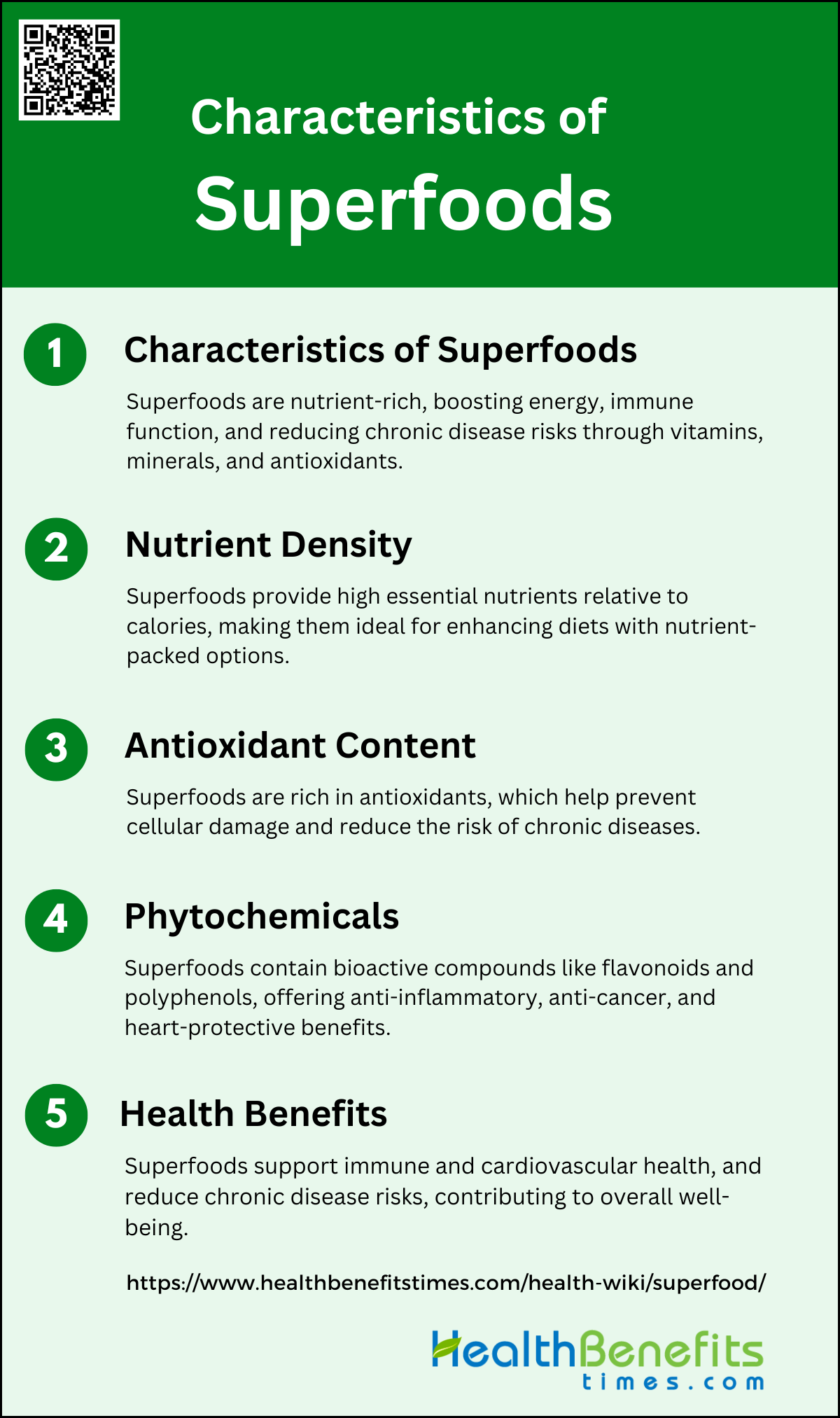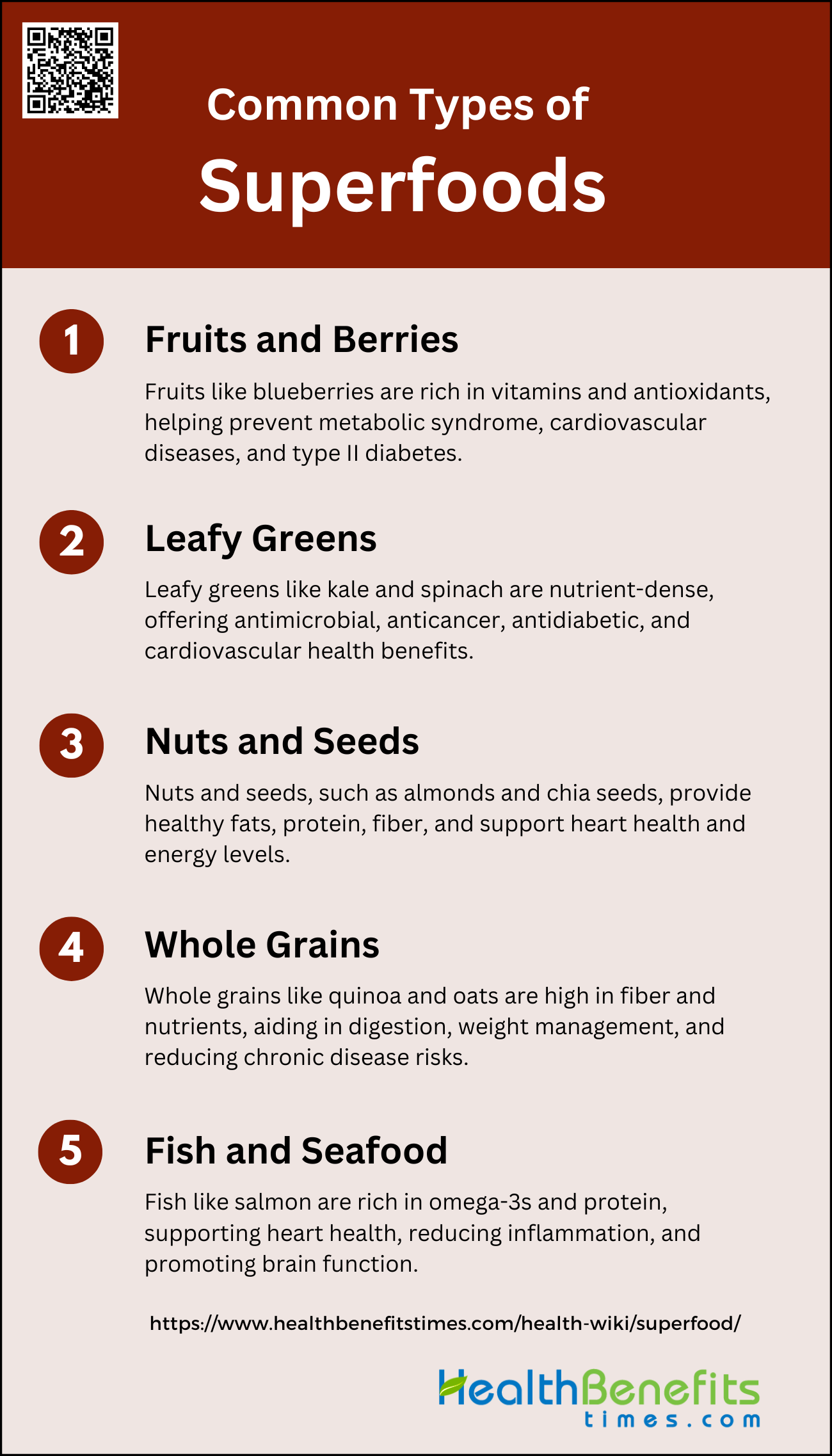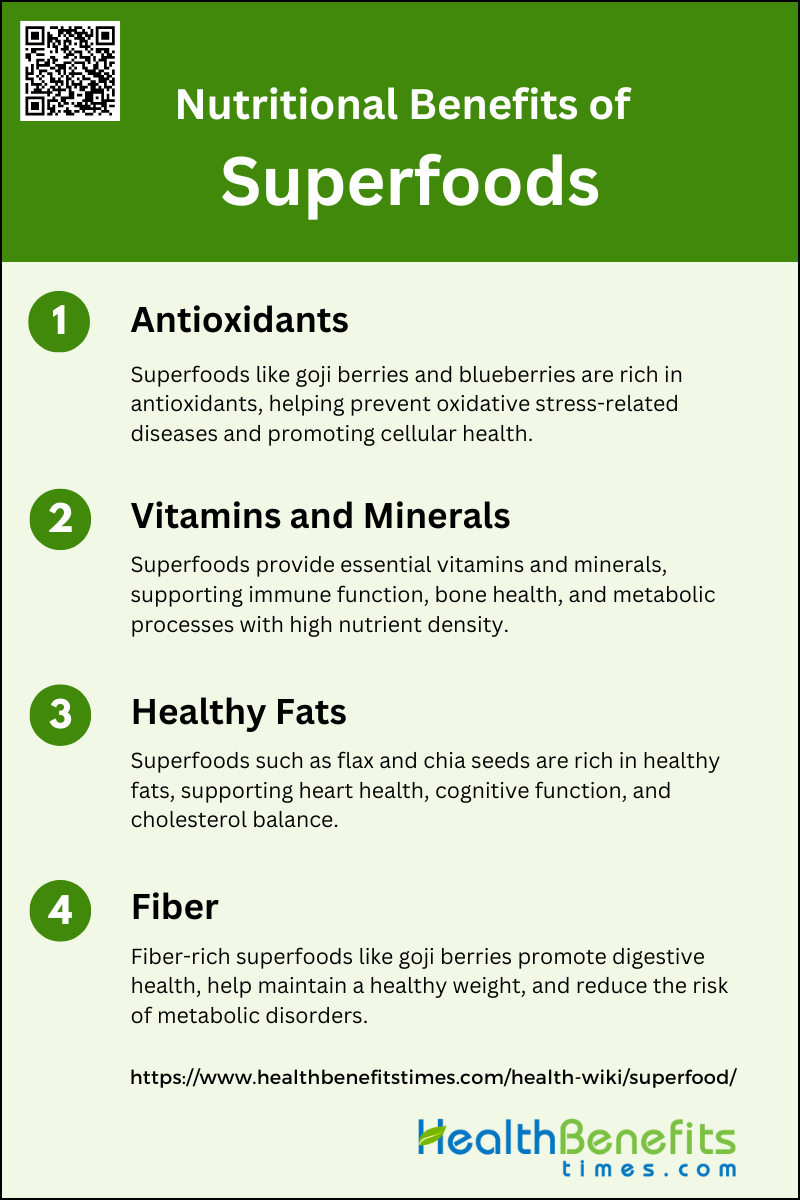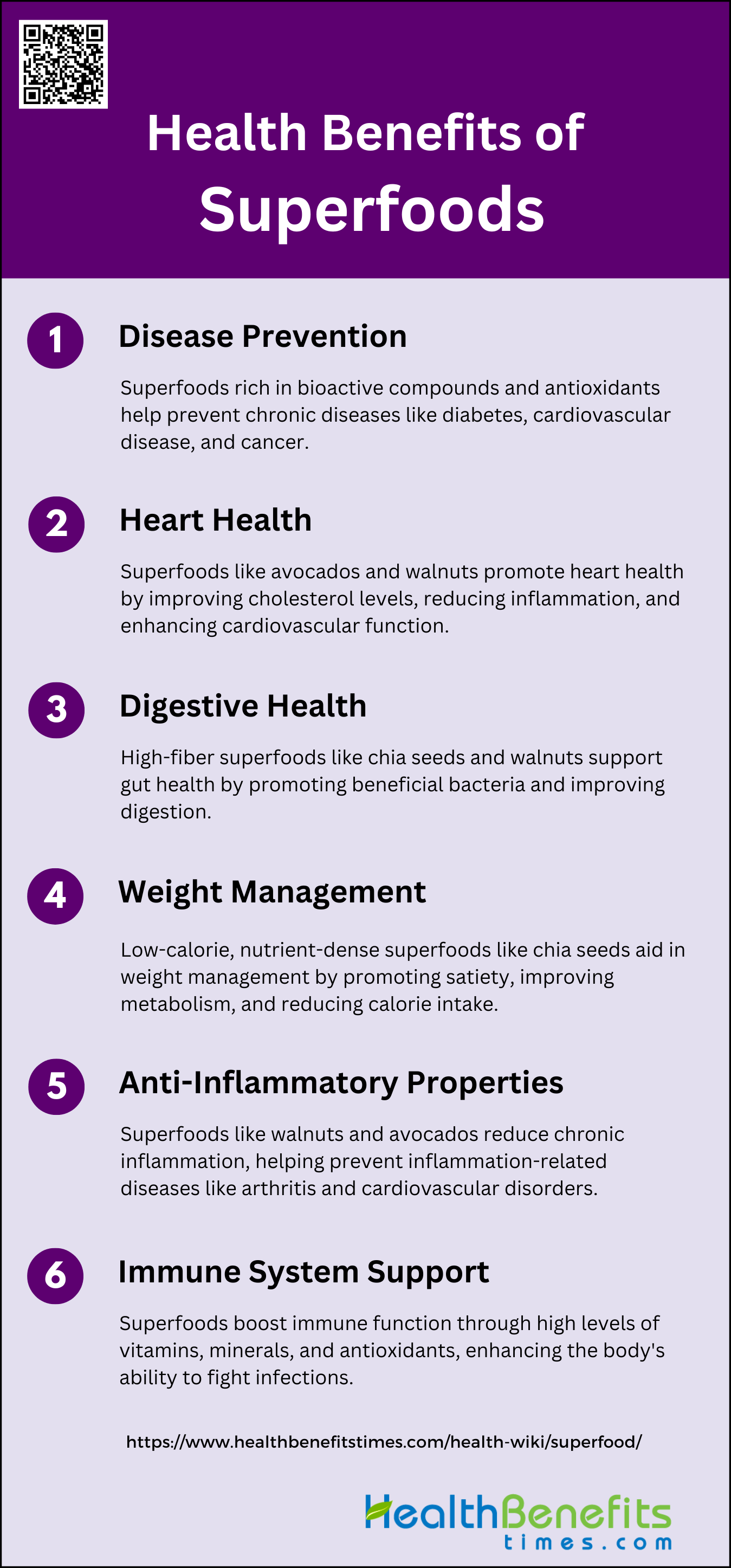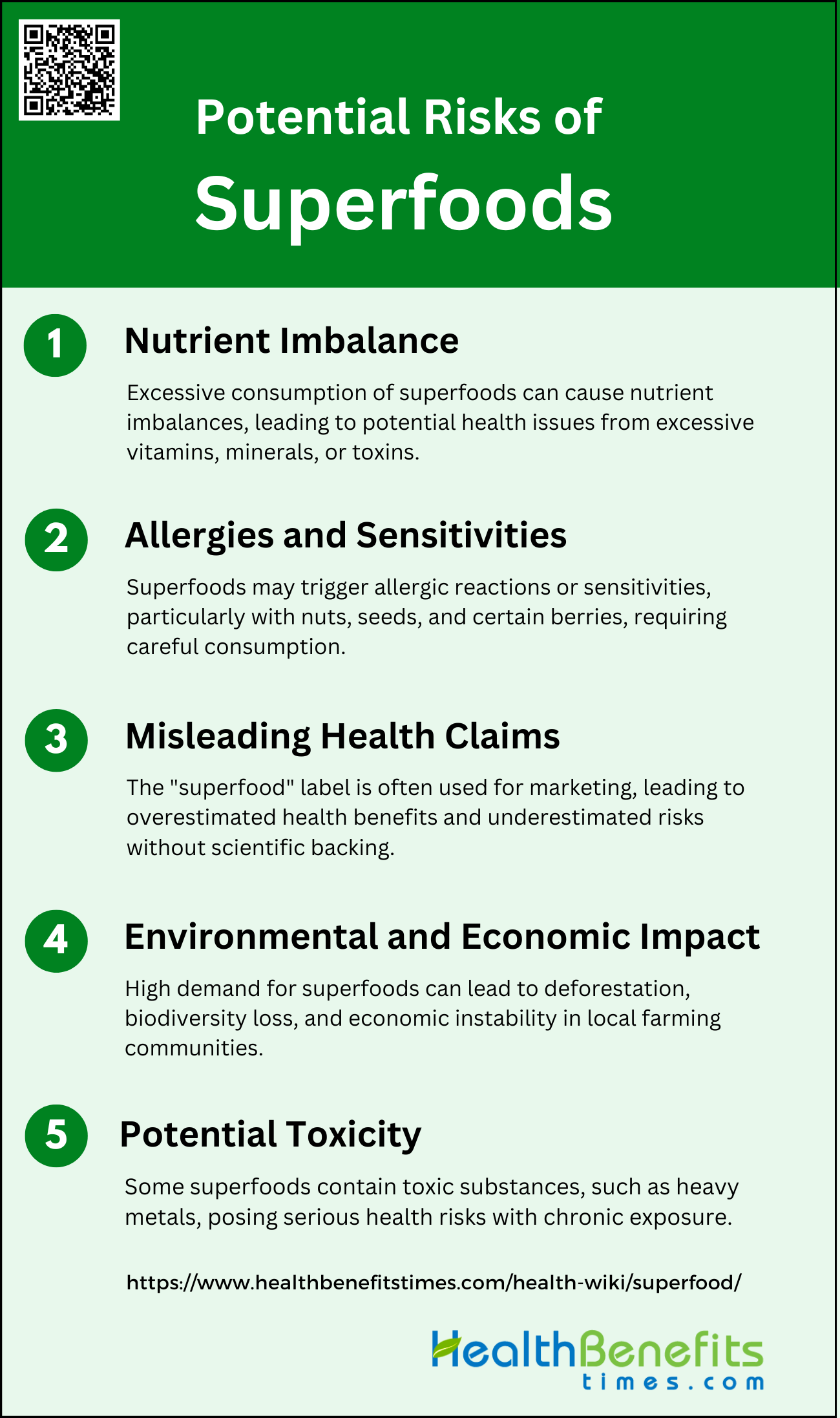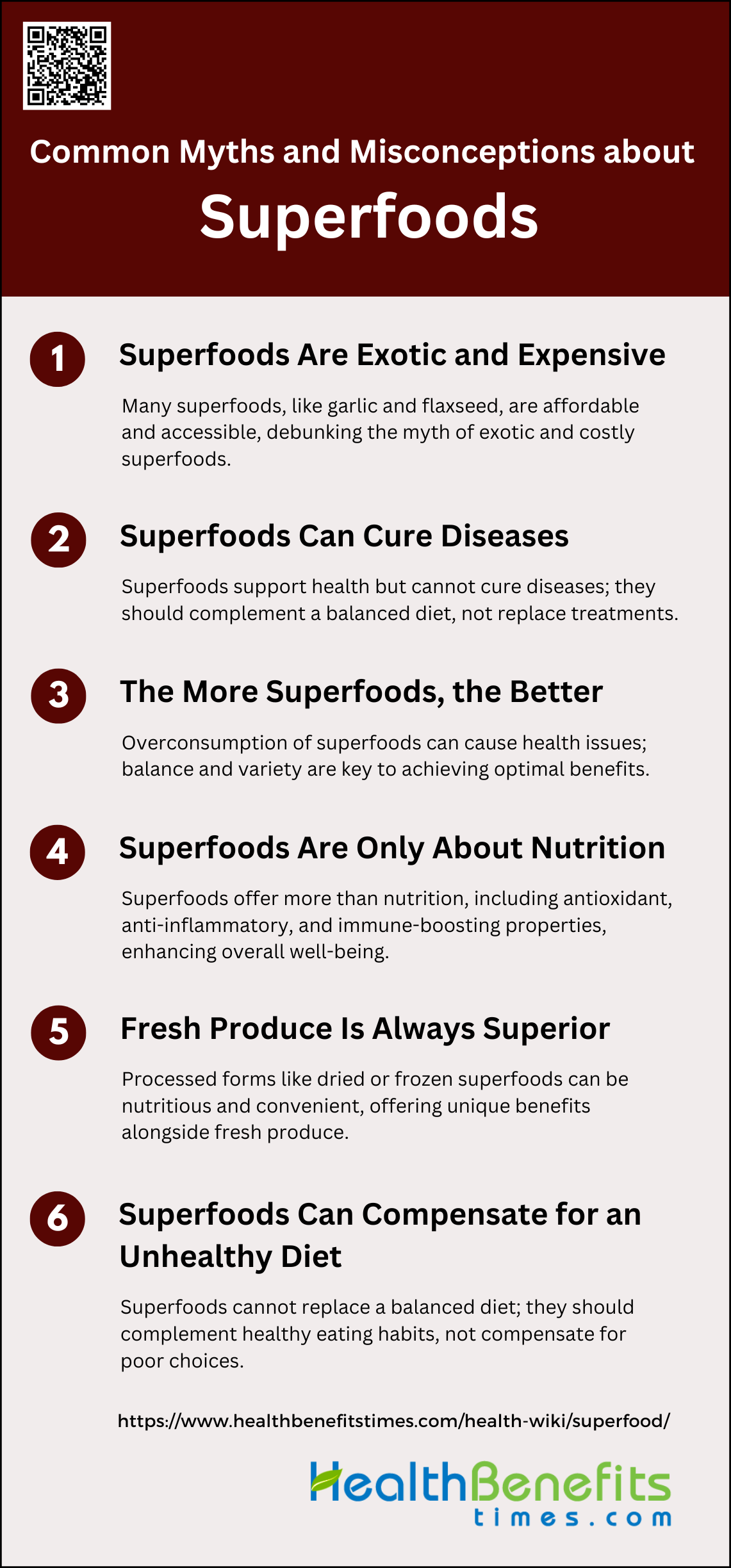A superfood is a term popularized by the marketing industry to describe foods that are purported to have superior nutritional benefits compared to common foods. These foods are often rich in antioxidants, vitamins, and other bioactive compounds that can contribute to the prevention of chronic diseases such as cardiovascular diseases, diabetes, and cancer. Common examples of superfoods include quinoa, goji berries, acai berries, chia seeds, and flaxseeds, which are known for their high nutrient density and potential health benefits. Despite their popularity, there is no universally accepted scientific definition of superfoods, and the term is often used more for its marketing appeal than for any standardized nutritional criteria. The consumption of superfoods is believed to support overall health and well-being, but their benefits are most effective when they are part of a balanced diet and healthy lifestyle.
Characteristics of Superfoods
Superfoods are nutrient-rich foods considered to be especially beneficial for health and well-being. They are packed with vitamins, minerals, and antioxidants that can help boost energy levels, improve immune function, and reduce the risk of chronic diseases. Below are some key characteristics that make these foods stand out:
1. Nutrient Density
Superfoods are renowned for their high nutrient density, meaning they provide a substantial amount of essential nutrients relative to their caloric content. These foods are typically rich in vitamins, minerals, and other vital nutrients that are crucial for maintaining overall health. For instance, flax seeds, chia seeds, and hulled sunflower seeds have been shown to contain significant amounts of proteins, essential minerals, and polysaccharides, which contribute to their high nutrient density. This nutrient richness makes superfoods an excellent choice for those looking to enhance their diet with nutrient-packed options.
2. Antioxidant Content
One of the defining characteristics of superfoods is their high antioxidant content. Antioxidants are compounds that help neutralize free radicals, thereby preventing cellular damage and reducing the risk of chronic diseases. For example, Lonicera caerulea and Aronia melanocarpa are noted for their exceptionally high antioxidant activity, surpassing that of more commonly consumed berries like blackberries and strawberries. Similarly, sunflower seeds have been identified to possess significant antioxidant properties, which contribute to their health benefits. The high antioxidant content in these superfoods plays a crucial role in promoting health and preventing diseases.
3. Phytochemicals
Phytochemicals are bioactive compounds found in plants that have various health benefits. Superfoods are particularly rich in these compounds, which include flavonoids, carotenoids, and polyphenols. These phytochemicals have been shown to have anti-inflammatory, anti-cancer, and heart-protective properties. For instance, the phytochemicals in fruits and vegetables have been linked to a reduced risk of chronic diseases such as cancer and cardiovascular diseases. The presence of these bioactive compounds in superfoods enhances their health-promoting properties, making them a valuable addition to a balanced diet.
4. Health Benefits
The health benefits of superfoods are extensive and well-documented. These foods are known to support the immune system, improve cardiovascular health, and reduce the risk of chronic diseases such as diabetes and cancer. For example, the bioactive compounds in avocados have been shown to have potential therapeutic properties, including anti-inflammatory and anti-cancer effects. Additionally, the consumption of superfoods like berries, nuts, and seeds has been associated with improved metabolic health and a reduced risk of obesity and related conditions. Incorporating superfoods into one’s diet can thus provide a wide range of health benefits, contributing to overall well-being.
Common Types of Superfoods
Superfoods are celebrated for their exceptional nutrient density and health benefits. They come in various forms, each offering unique advantages to support overall well-being. Here are some common types of superfoods you should consider incorporating into your diet:
1. Fruits and Berries
Fruits and berries like blueberries and acai berries are often labeled as superfoods due to their high content of vitamins, minerals, and antioxidants. These nutrients can help in the prevention of metabolic syndrome, cardiovascular diseases, and type II diabetes mellitus by reducing waist circumference, blood pressure, and improving cholesterol levels. Blueberries, in particular, have been studied extensively for their health benefits, including their potential to improve metabolic syndrome parameters.
2. Leafy Greens
Leafy greens such as kale and spinach are nutrient-dense foods rich in vitamins A, C, and K, as well as minerals like iron and calcium. These greens are known for their health-promoting properties, including antimicrobial, anticancer, antidiabetic, antioxidant, antiobesity, and cardio-beneficial effects. Quinoa greens, although less commonly consumed, also offer similar benefits and are a promising addition to the diet for their high nutrient content and health benefits.
3. Nuts and Seeds
Nuts and seeds, including almonds and chia seeds, are packed with essential nutrients such as healthy fats, protein, fiber, vitamins, and minerals. They are known to support heart health, improve cholesterol levels, and provide a good source of energy. Chia seeds, in particular, have been studied for their potential to improve metabolic syndrome parameters, although evidence is limited and inconsistent.
4. Whole Grains
Whole grains like quinoa and oats are celebrated for their high fiber content, essential amino acids, and various vitamins and minerals. These grains can help in weight management, improve digestion, and reduce the risk of chronic diseases such as heart disease and diabetes. Quinoa, specifically, is noted for its comprehensive nutrient profile and health-promoting properties, including being gluten-free and rich in protein and omega-3 fatty acids.
5. Fish and Seafood
Fish and seafood, such as salmon and sardines, are excellent sources of omega-3 fatty acids, high-quality protein, and essential vitamins and minerals. These nutrients contribute to heart health, reduce inflammation, and support brain function. Regular consumption of fish and seafood is associated with a lower risk of chronic diseases, including heart disease and metabolic syndrome.
Nutritional Benefits of Superfoods
Superfoods are renowned for their high nutritional value and health-promoting properties. They are rich in essential vitamins, minerals, and antioxidants that can enhance overall health and prevent diseases. Here are some of the key nutritional benefits of incorporating superfoods into your diet:
1. Antioxidants
Superfoods are renowned for their high antioxidant content, which plays a crucial role in scavenging free radicals and preventing oxidative stress-related diseases. For instance, goji berries have been shown to possess potent antioxidant properties due to their high phenolic content. Similarly, other superfoods like blueberries, cranberries, and strawberries are rich in bioactive compounds that exhibit significant antioxidant activity, contributing to the prevention of chronic degenerative diseases such as cardiovascular disease and cancer. These antioxidants help in maintaining cellular health and reducing inflammation, thereby promoting overall well-being.
2. Vitamins and Minerals
Superfoods are a dense source of essential vitamins and minerals, which are vital for maintaining various bodily functions. For example, mushrooms and algae are rich in essential minerals and vitamins, including a complete profile of amino acids, making them valuable dietary sources. Fruits and vegetables, another category of superfoods, supply a wide range of vitamins and minerals, such as vitamin C, potassium, and folate, which are crucial for immune function, bone health, and overall metabolic processes. The high nutrient density of superfoods ensures that even small quantities can significantly contribute to meeting daily nutritional requirements.
3. Healthy Fats
Certain superfoods are excellent sources of healthy fats, which are essential for heart health and cognitive function. Seeds like flax, chia, and hemp are particularly rich in omega-3 fatty acids, which have been shown to improve cell viability and possess anti-inflammatory properties. These healthy fats help in reducing bad cholesterol levels and promoting good cholesterol, thereby lowering the risk of cardiovascular diseases. Additionally, the inclusion of healthy fats in the diet aids in the absorption of fat-soluble vitamins, further enhancing the nutritional benefits of superfoods.
4. Fiber
Fiber is another significant component of many superfoods, contributing to digestive health and the prevention of metabolic disorders. Fruits and vegetables are particularly high in dietary fiber, which is linked to a lower incidence of cardiovascular disease and obesity. The fiber content in superfoods like goji berries and Euryale ferox (foxnut) not only aids in digestion but also helps in maintaining a healthy weight by promoting a feeling of fullness. Regular consumption of fiber-rich superfoods can improve gut health, regulate blood sugar levels, and reduce the risk of developing type II diabetes.
Health Benefits of Superfoods
Superfoods are packed with essential nutrients that offer numerous health benefits. They can boost your immune system, improve heart health, and enhance overall well-being. Here are some of the key health benefits of including superfoods in your diet:
1. Disease Prevention
Superfoods are rich in bioactive compounds that can help prevent chronic degenerative diseases such as diabetes, cardiovascular disease, obesity, and cancer. These foods are nutrient-dense and possess antioxidant properties that scavenge free radicals, thereby preventing the development of various degenerative diseases. For instance, the consumption of superfoods like berries, pomegranates, and green tea has been linked to reduced disease risk due to their high antioxidant content. Regular inclusion of these foods in a balanced diet can significantly contribute to disease prevention and overall health improvement.
2. Heart Health
Superfoods play a crucial role in promoting heart health by improving metabolic parameters and reducing risk factors associated with cardiovascular diseases. Foods like avocados, rich in antioxidants and healthy fats, have been shown to lower bad cholesterol levels and improve heart function. Additionally, walnuts, which are high in polyunsaturated fatty acids and antioxidant polyphenols, contribute to heart health by reducing inflammation and improving lipid profiles. Regular consumption of these nutrient-rich foods can help maintain a healthy heart and prevent cardiovascular diseases.
3. Digestive Health
Superfoods such as chia seeds, flaxseeds, and walnuts are beneficial for digestive health due to their high fiber content and prebiotic properties. These foods promote the growth of beneficial gut bacteria, enhancing gut microbiome health and improving digestion. For example, walnuts have been shown to positively influence the gut microbiome, promoting the growth of beneficial bacteria and improving overall gut health. Including these superfoods in the diet can support a healthy digestive system and prevent gastrointestinal issues.
4. Weight Management
Superfoods can aid in weight management by providing essential nutrients while being low in calories. Foods like chia seeds and flaxseeds are high in fiber, which promotes satiety and reduces overall calorie intake. Additionally, the consumption of nutrient-dense superfoods can improve metabolic health and support weight loss efforts. For instance, incorporating these foods into a balanced diet can help regulate body weight and prevent obesity-related complications. Their role in weight management is supported by their ability to enhance metabolism and reduce hunger.
5. Anti-Inflammatory Properties
Many superfoods possess potent anti-inflammatory properties that can help reduce chronic inflammation and related diseases. Walnuts, for example, contain ellagitannins, which are metabolized into bioactive urolithins with strong anti-inflammatory effects. Similarly, avocados are rich in antioxidants and bioactive compounds that can reduce inflammation and support overall health. Regular consumption of these anti-inflammatory superfoods can help manage and prevent conditions like arthritis, cardiovascular diseases, and other inflammation-related disorders.
6. Immune System Support
Superfoods are known to boost the immune system due to their high content of vitamins, minerals, and antioxidants. Foods like berries, green tea, and nuts are rich in bioactive compounds that enhance immune function and protect against infections. For instance, the antioxidants in these foods help neutralize free radicals, reducing oxidative stress and supporting immune health. Including a variety of superfoods in the diet can strengthen the immune system and improve the body’s ability to fight off illnesses.
Incorporating Superfoods into Your Diet
Practical Tips
Incorporating superfoods into your daily meals can be simple and enjoyable. Start your day with a nutrient-packed smoothie by blending spinach, blueberries, and chia seeds. Add a handful of nuts or seeds to your salads for a crunchy texture and extra nutrients. You can also sprinkle flaxseeds or hemp seeds on your yogurt or oatmeal. For dinner, consider adding garlic and ginger to your stir-fries or soups for added flavor and health benefits. These small changes can make a big difference in your overall health.
Budget-Friendly Options
Affordable superfoods are more accessible than you might think. Common items like beans, garlic, and spinach are nutrient-dense and inexpensive. You can find these at any local grocery store or farmers’ market. Seasonal fruits and vegetables are often cheaper and just as nutritious. For example, apples, carrots, and cabbage are budget-friendly and packed with vitamins and minerals. Buying in bulk and opting for frozen versions can also help you save money while still reaping the health benefits of superfoods.
Meal Planning
A simple meal plan incorporating a variety of superfoods can be both delicious and nutritious. For breakfast, enjoy a smoothie with spinach, berries, and chia seeds. Lunch could be a quinoa salad with mixed greens, avocado, and a sprinkle of flaxseeds. For dinner, try a stir-fry with garlic, ginger, and a mix of colorful vegetables like bell peppers and broccoli. Snack on nuts, seeds, or a piece of fruit like an apple or a handful of berries. This plan ensures you get a range of nutrients throughout the day.
Potential Risks of Superfoods
While superfoods are often praised for their health benefits, it’s important to be aware of potential risks. Overconsumption or improper use can lead to adverse effects and nutrient imbalances. Here are some potential risks associated with superfoods:
1. Nutrient Imbalance
Superfoods are often praised for their high nutrient content, but excessive consumption can lead to nutrient imbalances. For instance, while flaxseed is rich in omega-3 fatty acids, it also contains high levels of cadmium, which can be harmful in large amounts. Similarly, the overconsumption of certain superfoods might lead to an excessive intake of specific vitamins or minerals, potentially causing adverse health effects. Therefore, it is crucial to consume a balanced diet that includes a variety of foods to avoid nutrient imbalances and ensure overall health.
2. Allergies and Sensitivities
Superfoods can also pose risks for individuals with allergies and sensitivities. For example, nuts and seeds, which are common superfoods, can trigger severe allergic reactions in susceptible individuals. Additionally, some superfoods like goji berries and quinoa may cause gastrointestinal discomfort or other allergic responses in certain people. It is essential for consumers to be aware of their own sensitivities and to introduce new superfoods into their diet gradually to monitor any adverse reactions.
3. Misleading Health Claims
The term “superfood” is often used in marketing to imply superior health benefits, but these claims can be misleading. There is no legal or scientific definition of a superfood, and the purported health benefits are not always supported by robust scientific evidence. Many consumers may overestimate the health benefits and underestimate the potential risks, leading to a skewed perception of these foods. It is important for consumers to critically evaluate health claims and rely on scientific evidence rather than marketing hype.
4. Environmental and Economic Impact
The rising demand for superfoods has significant economic and environmental impacts. The cultivation of superfoods often involves extensive land use, leading to deforestation and loss of biodiversity. Additionally, the transportation of these foods from their countries of origin to global markets contributes to a large carbon footprint. Economically, the boom-and-bust cycles of superfood markets can destabilize local farming communities, as farmers may abandon their crops when prices fall below production costs. Sustainable practices and mindful consumer choices are essential to mitigate these impacts.
5. Potential Toxicity
Some superfoods may contain toxic substances, such as heavy metals, which pose health risks. For instance, studies have found high levels of cadmium in flaxseed and arsenic in green tea, both of which are popular superfoods. Chronic exposure to these heavy metals can lead to serious health issues, including kidney damage and cancer. Regular monitoring and stringent safety regulations are necessary to ensure that superfoods are safe for consumption and do not pose long-term health risks.
Common myths and misconceptions about Superfoods
Superfoods are often surrounded by various myths and misconceptions that can lead to confusion. It’s essential to separate fact from fiction to make informed dietary choices. Here are some common myths and misconceptions about superfoods:
1. Superfoods Are Exotic and Expensive
A common misconception is that superfoods are exotic and expensive. However, many superfoods are actually quite accessible and affordable. For instance, foods like garlic, ginger, and flaxseed are often labeled as superfoods and are widely available in local markets at reasonable prices. The perception that superfoods must be imported or rare is largely driven by marketing strategies rather than nutritional science. In reality, many everyday foods possess the nutrient density and health benefits that qualify them as superfoods.
2. Superfoods Can Cure Diseases
Another myth is that superfoods can cure diseases. While superfoods are rich in nutrients and bioactive compounds that can support overall health and help prevent certain conditions, they are not a cure-all. For example, while foods like berries and nuts have been shown to have beneficial effects on metabolic syndrome and type 2 diabetes, they should be part of a balanced diet and healthy lifestyle rather than relied upon as a sole treatment. The idea that superfoods alone can cure diseases is an oversimplification and can lead to unrealistic expectations.
3. The More Superfoods, the Better
The belief that consuming more superfoods will lead to better health outcomes is also a misconception. While superfoods are nutrient-dense, overconsumption can lead to imbalances and other health issues. For instance, excessive intake of certain superfoods like chia seeds or flaxseeds can cause digestive problems due to their high fiber content. It is essential to consume superfoods as part of a varied and balanced diet to achieve optimal health benefits.
4. Superfoods Are Only About Nutrition
Superfoods are often thought to be solely about nutrition, but they also offer other benefits. For example, many superfoods contain bioactive compounds that have antioxidant, anti-inflammatory, and immune-boosting properties. These compounds can help in reducing the risk of chronic diseases and improving overall well-being. Therefore, the benefits of superfoods extend beyond basic nutrition to include functional health advantages.
5. Fresh Produce Is Always Superior
There is a common belief that fresh produce is always superior to other forms of superfoods. However, dried, frozen, or processed forms of superfoods can also be highly nutritious. For example, dried berries and frozen vegetables retain most of their nutrients and can be more convenient and longer-lasting. Additionally, some superfoods like fermented dairy products can offer unique health benefits that fresh produce cannot. Thus, both fresh and processed superfoods can be valuable additions to a healthy diet.
6. Superfoods Can Compensate for an Unhealthy Diet
The notion that superfoods can compensate for an unhealthy diet is misleading. While superfoods are nutrient-rich, they cannot make up for the negative effects of poor dietary choices. A balanced diet and healthy lifestyle are crucial for achieving and maintaining good health. Superfoods should be seen as a complement to, rather than a substitute for, a well-rounded diet that includes a variety of nutrient-dense foods.
FAQs
1. Are Superfoods Suitable for Everyone?
While superfoods offer numerous health benefits, they may not be suitable for everyone. For instance, individuals with specific allergies, sensitivities, or medical conditions may need to avoid certain superfoods. Additionally, people on certain medications should consult with a healthcare provider before incorporating large amounts of superfoods like grapefruit or green tea, which can interact with medications.
2. Can Superfoods Help with Weight Loss?
Superfoods can support weight loss by providing nutrient-dense options that promote satiety and reduce the need for high-calorie foods. However, they should not be seen as miracle solutions for weight loss. A balanced diet, regular exercise, and healthy lifestyle choices are essential for sustainable weight management.
3. Do Superfoods Lose Their Nutritional Value When Cooked?
The nutritional value of some superfoods can be affected by cooking. For example, certain antioxidants and vitamins may degrade when exposed to high heat. However, cooking can also enhance the availability of some nutrients, such as lycopene in tomatoes. It’s important to consider both raw and cooked forms of superfoods in your diet.
4. Are There Any Risks in Combining Multiple Superfoods?
While superfoods are generally healthy, combining too many in large quantities can lead to digestive issues or nutrient imbalances. For example, consuming excessive amounts of fiber-rich superfoods like chia seeds and flaxseeds can cause bloating or constipation. It’s best to consume a variety of superfoods in moderation.
5. Can Superfoods Replace Supplements?
Superfoods can provide many of the vitamins, minerals, and antioxidants that supplements offer. However, they may not always provide sufficient amounts of specific nutrients that some people require in higher doses, such as vitamin D or B12. Supplements may still be necessary for individuals with certain deficiencies or dietary restrictions.
6. Are Organic Superfoods Better Than Non-Organic?
Organic superfoods are grown without synthetic pesticides and fertilizers, which may appeal to those concerned about chemical residues. However, both organic and non-organic superfoods can offer similar nutritional benefits. The choice between organic and non-organic often depends on personal preference and budget.
7. What Are the Environmental Impacts of Superfoods?
The environmental impact of superfoods varies depending on factors such as farming practices, transportation, and packaging. Some superfoods, like quinoa, have seen increased demand that can strain local ecosystems. Opting for locally grown superfoods or those with sustainable certifications can help reduce environmental impact.
8. How Do I Know If a Food Is Truly a Superfood?
The term “superfood” is not regulated, so it can be challenging to determine whether a food truly offers exceptional health benefits. Look for scientific evidence supporting the nutritional claims of a superfood and be cautious of products labeled as superfoods based on marketing rather than research.
9. Can Superfoods Improve Mental Health?
Certain superfoods, like fatty fish rich in omega-3 fatty acids, dark chocolate, and berries, have been associated with improved mental health and cognitive function. These foods may help reduce symptoms of depression and anxiety, but they are not a substitute for professional mental health treatment.
10. What Are Some Superfoods for Specific Dietary Needs (e.g., Vegan, Gluten-Free)?
There are superfoods suitable for various dietary needs. For example, quinoa is a gluten-free grain that is also a complete protein, making it an excellent choice for vegans and those with gluten intolerance. Similarly, chia seeds are rich in omega-3s and can be used in vegan diets as an egg substitute.



